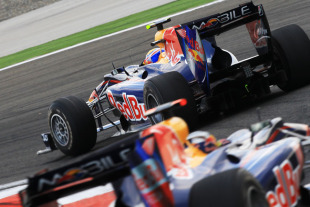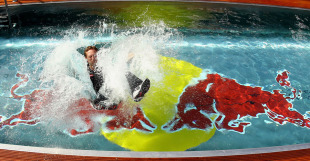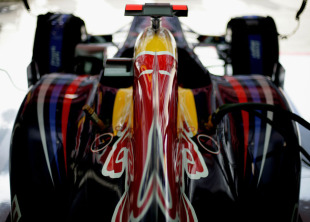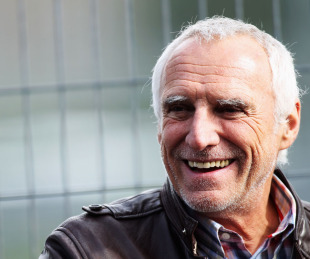- Formula Money
How Red Bull gives us wins

- Drivers:
- Christian Horner
- |
- Dietrich Mateschitz
- |
- Sebastian Vettel
- |
- Mark Webber
- Teams:
- Red Bull
Red Bull is not the kind of brand which you would expect to find fielding a driver who leads the F1 world championship. The Austrian energy drinks company is one of very few businesses in its industry which doesn't just sponsor sports but actually owns them. Its investments range from football teams to an air racing series and two F1 teams with its flagship Red Bull Racing still favourite to win the title this year despite a series of reliability problems. Surprisingly, despite being a global brand, it hasn't achieved this by simply throwing cash away.
When Red Bull bought Jaguar for £1 in November 2004 and renamed it Red Bull Racing there were concerns that the company was not getting involved with F1 to win races but simply to promote its products. Red Bull had been hanging around on the sidelines of the sport for years first as a part-owner and sponsor of the Sauber team and then as a sponsor of Jaguar. It only paid around $2m annually to sponsor Jaguar raising fears that it might not be interested in investing in the team. The critics were wrong.
Red Bull has invested its money in F1 wisely. In total it has spent $1bn on F1 - around half of the $2.1bn which Toyota spent in its fruitless eight years in the sport and nearly a third of the $2.8bn Honda poured into F1. However, Red Bull's co-founder Dietrich Mateschitz suggests that although this may seem carefully controlled, in fact it has been more akin to flying by the seat of its pants.
"In F1 we have no long or medium term business plans," says Mateschitz and, with a grin, he looks beyond the championship which seems set for his team adding that "the goal is to reach the top as quickly as possible and stay there for as long as possible."

However, arguably the team's most important appointment came at the end of 2005 when it lured legendary designer Adrian Newey from the rival McLaren team and it took more than just the promise of a salary estimated at $10m to do this. In addition to Red Bull Racing, the drinks company also owns Toro Rosso, the team formerly known as Minardi which it bought in September 2005. This makes Red Bull the only company which owns two teams in F1 and it gives Newey the unique opportunity to design and compare two different chassis.
Red Bull Racing's immediate parent is Red Bull Technology and this UK company designs, develops and manufactures the cars for both Red Bull teams. It allows Red Bull to make economies of scale in manufacturing and procurement although the design of the Toro Rosso and Red Bull Racing chassis has to be different for both teams to classify as constructors.
The concern raised over Red Bull owning two teams is one of an extremely small number of occasions where the drinks company strayed close to controversy in F1. This in itself is a remarkable feat and goes a great way to explaining the secret behind Red Bull's solid reputation in F1. McLaren's scandals have involved lying and spying, Renault was accused of rigging a race and Ferrari has been accused of bias but Red Bull has kept its nose extremely clean. It makes the repeated accusations earlier this year of Red Bull Racing having a ride-height system all the more surprising.

In 2005 Red Bull provided £58.3m to Red Bull Technology but by 2008 it had soared to £82.5m. Red Bull can certainly afford it. Last year the company sold 3.9bn cans of its energy drink and it weathered the recession well with revenues only down by 1.7% year-on-year to €3.2bn. Red Bull does not disclose its bottom line figures but it says that consistent cost management led to a "significant increase in productivity and profit." It is likely to have given a boost to Mateschitz' fortune which already stands at $4.1bn according to Forbes.
"Red Bull cannot talk about the financial success," says Mateschitz explaining that "the only success and return on investment is the marketing value." This is where Red Bull is really coming into its own.
Red Bull has got maximum exposure through its logo literally covering all corners on the cars of its two teams. Cleverly, by keeping the Red Bull brand clear of association with other sponsorship clutter, it has increased its exclusivity which thereby gives the space on the car a higher value when it comes to be sold. Having built their budgets around having next to no sponsorship income, any deals which do come the way of Red Bull's teams are a welcome bonus.
Red Bull Racing finished in its best-ever place of second last year and this sent sponsors beating a path to its door. Pepe Jeans and FXDD both joined the team this year and together bring an estimated $6m annually according to F1's industry monitor Formula Money. That may only be the beginning.

The most well-known precedent of two top brands sitting side-by-side in the name of an F1 team is that of Benetton which had title sponsorship from the Mild Seven tobacco brand when it won the world championship in 1994 and 1995.
The title sponsorship could bring in around £30m, which is less than some other sponsors pay to get their brands in team names and the reason for this is that a partner would have to share billing with such a strong product-based brand in the form of Red Bull itself.
It isn't known which sponsors Red Bull Racing would accept for this prestigious position but the team is believed to be targeting luxury goods companies. Could an Apple or a Rolex Red Bull Racing be on the cards? Maybe. Given its success over the past five years in F1 it seems hard to predict just how high Red Bull will soar.

